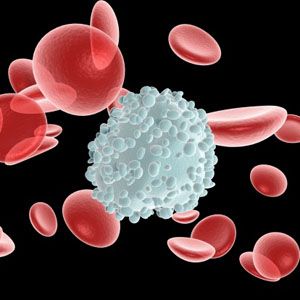The lymphocytes play a crucial role in the body’s immune system. These cells are found in lymphoid tissues and organs, and the circulation system in the body. There are mainly 2 types of lymphocytes: B lymphocytes (B cells) and T lymphocytes (T cells). What are their functions?
What Do Lymphocytes Do?

The B lymphocytes are the first line of defense. These cells are designed to produce antibodies specific to certain trigger antigens. Once a B cell recognizes an antigen, it is stimulated to give rise to plasma cells. Then plasma cells can produce large numbers of antibodies that will attack and neutralize the antigen in the body. The mechanism by which the antibody and antigen attach to each other is similar to that of a lock and key, and once this connection has been made, the antigen will be destructed.
The T lymphocytes help the immune system in 2 ways. First, they can recognize and destroy antigens directly. Second, T cells can release chemical mediators that tell other defensive cells to try and fight the foreign invader.
What Do Other Components of the Immune System Do?
What do lymphocytes do? Now you know the answer, so what do other components of the immune system do?
1. Macrophages

The macrophages are the first immune cells to come into contact with antigens. They fight against antigens by entrapping the cells and breaking them down into smaller particles which can stimulate T lymphocytes. Macrophages also release chemicals to attract and activate other lymphocytes.
2. Dendritic Cells

These cells are involved in antigen presentation. Their role is believed to be much more important than earlier thought and they may even hold a key part in the development of various cancer vaccines.
3. White Blood Cells

White blood cells have different types that are involved in the immune reaction.
- The neutrophils are the most abundant type found in the body and play a major role in the body’s response to inflammation.
- The eosinophils and basophils are other two types of white blood cells. They will increase when the body is suffering from an allergic reaction.
These different types of white blood cells play a very important role in the overall functioning of the immune system, and even a small defect in any one of them can lead to serious diseases.
How to Improve Functions of Lymphocytes
What do lymphocytes do? After knowing the answer, you may want to know how to improve their functions.
1. Eating a Diet Rich in Essential Nutrients
One of the most important factors that affect the normal function of lymphocytes is diet. You should make sure that you include enough essential nutrients as follows.
- Vitamin A: The lymphocytes are produced in the bone marrow and their transformation into mature cells requires the presence of vitamin A. T lymphocytes, in particular, are affected by the presence or absence of adequate vitamin A. They are found to be less effective when there is a deficiency of vitamin A in the body.
It is recommend to consume at least 3,000 IU of vitamin A for men and 2333 IU for women. Green veggies, carrots, and sweet potatoes are all sources rich in vitamin A.
- Vitamin B6: Vitamin B6 also plays a very crucial role in the maturation of B and T lymphocytes. This vitamin also helps in the formation of a protein called interleukin-2 that is essential for lymphocyte function.
1.3 mg of vitamin B6 should be ingested every day. You can get this vitamin from salmon, turkey or chicken. Spinach, bananas, and hazelnuts are also good sources of it.
- Zinc: Zinc is required in very small quantities by the body; however, its functions cannot be ignored. It is responsible for the activation and functioning of hundreds of proteins and enzymes, including thymulin in the body. Thymulin is responsible for the proper functioning of T-cells in the body.
An average male requires 11 mg of zinc daily, while an average woman requires 8 mg. Beef, oysters, crabs, peanuts, almonds and cashews are all excellent sources of zinc.
- Protein: A diet rich in protein is very important for lymphocytes to perform at its optimum. Protein is responsible for the formation of lymphocytes and the production of antibodies. You should always include enough protein in your diet for better lymphocytes functions.
Consume 0.4 grams of protein per pound of body weight daily. Good sources of protein include lean beef, salmon, bean products, etc.
- Beta carotene: Beta carotene has been found to increase the number of T cells in the body. It can be found in high quantities in sweet potatoes, lettuce, spinach, apricots, and cantaloupe.
2. Exercise Daily
What do lymphocytes do? They play a very important role in supporting the body's immune system, so their functions should be paid closely attention to. Exercising daily for about 30 minutes is very helpful in boosting the function of the immune system. This can increase the amount of lymphocytes being produced within normal limits, thus making the body less susceptible to infection. Which kind of exercise that you do does not really matter as long as it can get your heart rate up.
3. Avoid Stress As Much As You Can
There is a direct correlation between stress and your immune system. Practicing stress relieving techniques like yoga or meditation can improve the function of your lymphocytes. Spending 20-30 minutes per day practicing these techniques is all that is required.
